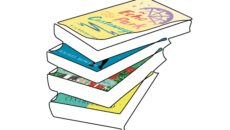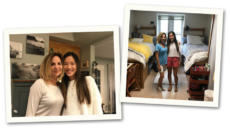When my son was little, one of his favorite books was Why Was I Adopted?, by Carole Livingston. The colorful illustrations caught his attention, and as we read the book over and over, its meaning began to seep into his mind. Several reasons for placing children for adoption were suggested. Perhaps the parents were too young to be parents themselves, or perhaps they came from a war-torn country, and it was not possible to raise a child there.
My son was adopted from El Salvador, where there was a civil war going on. I remember his focusing on the page about war. He saw another child who was adopted from a war-torn country. He was not alone.
Stories for Discussion
Books can help our children make sense of their own stories. They may have questions about things they don’t feel like talking about: being adopted, being raised by a single parent, being raised by gay or lesbian parents. While all of these situations are more common than they were 25 years ago, when my son arrived home, they still cause kids to feel different from their peers. Reading about kids their age who struggle with the same feelings, or who come from similar backgrounds, can make a world of difference.
Over the two decades I have been a single adoptive parent, my children and I have found many books to comfort and guide us. Here are a few of our favorites for young readers (ages 4-8):
Who’s in a Family, by Robert Skutch (Tricycle), introduces the reader to families composed of various ethnicities. It ends with a blank page, where children can draw a picture of their own family. The message is clear: Whatever the background of each member, love and commitment make a family.
A Mother for Choco, by Keiko Kasza (Putnam Juvenile), is the classic tale of a yellow bird, who goes searching for a mother. He meets Mrs. Bear, who appears to be single. She brings him home to join her other children, a hippo, an alligator, and a pig. The message that families are created through love and sharing is depicted in bright watercolor illustrations.
The Little Green Goose, by Adele Sansone (NorthSouth), has a similar message. In this story, Mr. Goose longs for a baby, and adopts a strange egg. A scaly-skinned, green “goose” hatches and calls him Mama. When the hens taunt the hatchling, he tries to find a mother who looks like him—only to realize where he truly belongs.
The Lamb-a-roo, by Diana Kimpton (Brighter Child), tells the story of a lonely lamb who wants a mother and a sad kangaroo who wants a baby. They find each other and become a family. When the lamb realizes he is different from other kangaroo kids and attempts to fit in, there are funny consequences.
Pablo’s Tree, by Pat Mora (Simon & Schuster), is about five-year-old Pablo, who looks forward to seeing his grandfather on his birthday. When his mother (a single woman) had first told her father she was going to adopt, he planted a special tree. Every year he decorates the tree for Pablo’s birthday.
I Love You Like Crazy Cakes, by Rose Lewis (Little, Brown), introduces us to a single mother who adopts a little girl from China. In the sequel, Every Year on Your Birthday, the mother describes her daughter’s first years, ending on her fifth birthday—which they celebrate with a picnic overlooking a dragon-boat festival.
The Red Blanket, by Eliza Thomas (Scholastic), is another vibrantly illustrated book about a single mother who adopted from China. It tells the tale of the blanket the mother buys to comfort her new daughter.
The Best Single Mom in the World: How I Was Adopted, by Mary Zisk (Albert Whitman), follows an adoption journey, told from the perspective of the young child.
Two Birthdays for Beth, by Gay Lynn Cronin (Perspectives), is a story of domestic adoption by a single, African-American woman. After hearing how her mother celebrated the day of her adoption, Beth wonders if she’ll get two parties. But, her mom explains: “Adoption is different, but the love is the same.” Books can normalize life for children in nontraditional families.
I would love to hear about some of your favorites. Happy reading!



